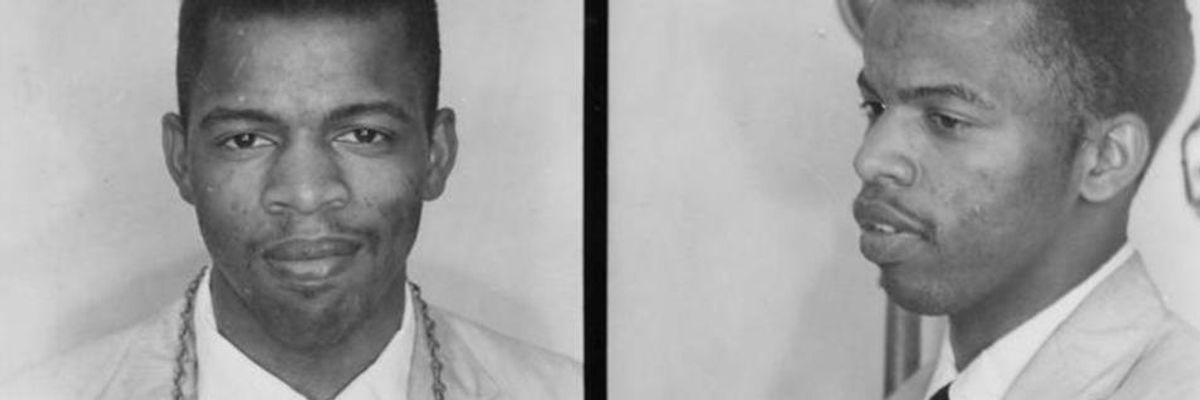Ah, 1961. The year -- certain aspects of it, anyway -- are almost impossible to remember. "Whites only" bathrooms, for instance.
U.S. Rep. John Lewis, legendary civil rights leader and crosser of lines, recently tweeted an ancient mugshot memorializing his arrest that year for using a "whites only" bathroom in Mississippi and, in the process, amping up outrage against Jim Crow segregation in the South and intensifying the civil rights movement's global resonance.
He was charged with disorderly conduct and spent 37 days at the Parchman Penitentiary. How difficult it is to fathom such smug, legally sanctified certainty. It all seems so long ago . . . those days when the people who ran things were so wrong.
I say this facetiously, of course.
The emergence of this mugshot from 53 years ago, and the memories of a long-gone era that unavoidably accompany it, somehow speaks volumes to the numerous movements for change that are simmering today. One reason is because the civil rights movement of the 1960s was actually successful. It turned the country around. It undid every last legal and moral justification that held together a whites-only Old South, and it seriously undermined much of the legally ensconced racism of the North.
No, it didn't end racism per se, which regrouped "legally" around a bloated prison-industrial complex, but it woke the nation up and created an enduring legacy of nonviolent, human-rights-based change. It set a standard for what's possible, at the same time exposing the vicious hatred, masquerading as moral sanctity, which held together the existing social order.
Perhaps what it also established was the legitimacy and necessity of nonviolent revolution -- a cognizance of the never-ending need to stand up against social wrong, to keep demanding change, to keep evolving.
Also: The moral value of the civil rights movement and the courageous actions of John Lewis and innumerable others, often at great personal hardship, sometimes at the cost of their lives, was not confined to one particular issue. An extraordinary antiwar movement emerged in the '60s, followed by a women's rights movement, a gay rights movement and an environmental movement. The civil rights struggle laid the groundwork for all of them. They're all connected -- which implies that a common core value underlies all these movements.
A few days ago, Jim Hightower, in an interview with Bill Moyers, said: "There is a growing rebellion and an increasing awareness among different groups fighting different battles that they are connected. . . . People are beginning to get together and see their common interest."
Certainly there are endless ways to attempt to describe this underlying value, but usually these attempts lack a pragmatic component. How does "getting together" actually unify and strengthen, rather than scatter, a given movement for social change?
This question -- this void -- hasn't been something I've devoted much conscious attention to, but when I began reading about the remarkable success in recent months and weeks of the "SuperPAC to end all SuperPACs," which has just raised $12 million to engage head on with the influence big money has in the U.S. political system, I felt like I'd found an answer I didn't know I'd been seeking.
Money has the potential to commodify everything we value. It eats the human commons. Not only is its heedless pursuit wrecking the planet, it is devouring all that remains of American democracy. And without democracy -- without a core sense of public empowerment -- every social change movement would collapse. Not only does corporate money wield an outrageous, and growing, influence on the political system at all levels, but even more ominously, public acceptance of this fact -- that Big Money rules -- gnaws away the belief that change is possible. We're drifting dangerously toward becoming Spectator Nation. This is a social coffin.
Pushing back against this possibility is MaydayPAC, founded by Harvard Law School professor, author and long-time activist Lawrence Lessig. He and his co-conspirators, urging people to "embrace the irony" of raising money to fight big money, have devised a remarkable, multi-stage, long-term political action plan aimed at winning key congressional races in 2014 and 2016, revving up national momentum and producing, by 2017, national legislation reforming the way elections are funded.
Such reform would, in one way or another -- through matching grants or vouchers --"produce a radical change in the range and nature of 'relevant funders' to congressional campaigns. If implemented effectively, candidates for Congress could run winning campaigns without being dependent upon large contributors," according to the MaydayPAC website.
What a stunning idea: devising a system that magnifies the giving power of the little guy -- or a hundred million little guys -- and allows women and men who embrace their beliefs, on reducing military funding, let us say, to run for office free of any dependence on corporate money and the interests of the military-industrial complex.
In 1961, bathrooms for white people commanded an outrageous, "this is the way things are" inevitability, which the civil rights movement obliterated. Could corporate ownership of democracy come to be seen, in the not too distant future, as no less outrageous and absurd?
